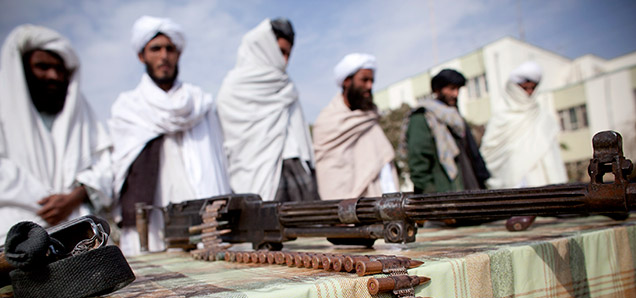Rumours of Grace: Radicalization - A word that's not always negative
 CREDIT: DANIEL BEREHULAK / GETTY IMAGES NEWS / THINKSTOCK
CREDIT: DANIEL BEREHULAK / GETTY IMAGES NEWS / THINKSTOCKWhy does being a radical need to be negative?
Radicalization is a word we have been hearing a lot recently. We use it to describe what happens when young people join violent Muslim organizations. The thinking is that normal young people would not join such a group. Something must have happened to them to make them into potentially dangerous people.
A radical group such as ISIS must have gotten to them. Those who care about students in Canada are disturbed to learn that this happens in this country, and many worry about the fate of young people who head into conflict zones in the name of such groups.
The radicalization of young people is not new. Nazi propagandists and educators brainwashed the kids and youth of Germany leading up to the Second World War. The Soviet rulers of the mid-20th century radicalized their young people into snitching on their own parents and having them sent to labour camps. Political regimes since the days of the ancient Babylonians and Egyptians have been turning their young into fanatics.
Radicalization is not new and it is also not always negative. Some radicalization is, in fact, extremely positive.
I attended the funeral of a friend a while ago. He is the one who inspired me to enter seminary and study to become a chaplain – something I did at Fanshawe College for nearly a decade.
Aren, a chaplain at McMaster University, was a remarkable man who always had time for people on the margins. Some of them were students with issues of mental health, addiction or family neglect. Some of them were gay and some, like me, were looking for something to do with their lives and were disaffected with the options presented to us by the modern world and modern post-secondary education.
At the memorial service for Aren, I reconnected with social workers, theologians, church ministers and others who had been deeply inspired by Aren’s sacrificial giving. His children jokingly – or maybe not jokingly – lamented that their father always made room around the family dinner table for the homeless person he had met that afternoon.
I think of the man who joined Aren and several others to try to live in an intentional Christian community – people sharing houses, growing their own food as much as possible and relocating to the undesirable areas of the city.
I think of “A” who just returned from Iraq on a Christian mission that brings food, blankets, shelter – along with the story of Jesus Christ – to refugees fleeing the violence in Iraq.
And beyond my own immediate circles other figures come to mind. One of them is Jean Vanier, the Catholic founder of L’Arche communities all over Canada and the world. He has just recently won the Templeton Prize for the work he has done to integrate his Christian-Catholic faith with his work.
These people have been radicalized.
They have worked hard at putting into practice the teachings and example of the founder of their Christian faith. We need more, not less of such radicalization. For one thing is clear from any reading of the life and death of Christ and his teachings. Implementing what he taught and imitating his actions brings about a transformation – a transformation towards peace, overall well-being, hope and love.
There is a feeling among many that religious radicalization is always negative. However, this is not true. One has to examine the core writings of religious traditions and the actions of the founders. Each set of writings and founder’s life will determine what radical adherence to this or that tradition looks like.
One could do much worse than study the Christian tradition that motivated Martin Luther King Jr., Jean Vanier, “A” and those who were moved by my friend Aren. The churches of this city and this country would do well to redouble their efforts to send young people radicalized in the ways of Jesus to bring about a new day of hope for our world. His living presence continues to oversee our world. And to a world in distress, his actions and teachings bring hope.
Editorial opinions or comments expressed in this online edition of Interrobang newspaper reflect the views of the writer and are not those of the Interrobang or the Fanshawe Student Union. The Interrobang is published weekly by the Fanshawe Student Union at 1001 Fanshawe College Blvd., P.O. Box 7005, London, Ontario, N5Y 5R6 and distributed through the Fanshawe College community. Letters to the editor are welcome. All letters are subject to editing and should be emailed. All letters must be accompanied by contact information. Letters can also be submitted online by clicking here.













